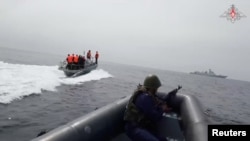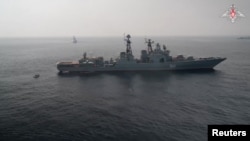As the war in Ukraine rages on, China and Russia are hosting joint military exercises in the Sea of Japan that analysts say are the latest sign of deepening cooperation between the two military powerhouses. The drills are also part of an effort to counter growing partnership of the U.S. and its allies in the region, they add.
“Russia and China are trying to convey to Japan and the U.S. that they are very unhappy with their cooperation in NATO and the [Indo-Pacific] region, and they want to prove that they can achieve the same level of cooperation in the region as [Washington and its allies,]” Stephen Nagy, a regional security expert at the International Christian University, told VOA.
For Russia, Nagy added, the drills are a way of showing “that they still have the capacity to manage conflicts on the eastern front but also provide capabilities to the Indo-Pacific region to work with China and pressure the U.S.”
“They want to prove that they can still work with China to cause major disruption, especially in Japan’s backyard,” he said.
On Thursday, Russia’s Defense Ministry announced that the “Northern/Interaction-2023” drills had begun in the Sea of Japan and would last until Sunday July 23. The ministry said that in addition to live artillery fire, the exercises will also include “anti-submarine and naval combat” drills.
The drills main aim, Russia’s ministry said, is to “strengthen naval cooperation” between the two countries and “maintain peace and stability in the Asia Pacific.” Russia and China say they have deployed more than 10 naval vessels and more than 30 military aircraft to take part in the exercise.
According to China’s state-run Global Times, the exercise marks the first time that both Russia’s navy and air force will participate in a joint exercise led by China.
Northern/Interaction-2023 is the first joint military exercise conducted near Japan this year, but according to the International Institute for Strategic Studies, Russia and China conducted at least five military exercises in the Sea of Japan and the East China Sea last year.
Forceful response?
The announcement of the exercise comes as ties are strengthening between the U.S., Japan, and South Korea, and follows a trilateral missile defense drill involving the three in the Sea of Japan this week aimed at countering North Korea’s nuclear and missile threats.
Some Chinese military commentators say China and Russia’s joint exercise is a forceful response to the trilateral drill conducted by the U.S. and its allies.
“The Chinese and Russian drills will focus on air defense exercise, anti-missile exercise, anti-submarine exercise, and anti-ship exercise,” Chinese military commentator Song Zhongping said in a video he released last Saturday. He added that he thinks Russia and China will conduct joint sea and air patrols following the exercise.
Since the waterways around the Sea of Japan are all crucial passages for the Chinese and Russian navies to get to the Western Pacific, Song added that China and Russia should challenge the trilateral military alliance because their presence threatens the security of that strategic waterway.
Beijing’s remarks about the drills have not been as explicit. A statement released on China’s defense ministry’s official social media account on WeChat Sunday, when Chinese vessels set out for the exercise, said the drill is aimed at “safeguarding the security of strategic waterways” in the Sea of Japan.
Multiple strategic goals
The military exercise is not just about countering the U.S. and its allies. Some experts think China and Russia also hope to fulfill some strategic goals through the drills.
Lin Ying-yu, a China military expert at Tamkang University in Taiwan told VOA that Beijing wants to learn from Moscow’s experience of countering attacks on their navy from land in the Ukraine war.
“During the war in Ukraine, Ukrainian forces have used missile or fighter jets to attack Russian ships at sea, so Russian forces have experience coping with this kind of attack,” he said.
Lin adds that the People’s Liberation Army could face similar situations if it attacked Taiwan and the island’s military could use anti-ship missiles or drones to target Chinese naval vessels in a cross-Strait conflict.
“Scenarios from the Ukraine war may be simulated in the China-Russia joint military exercise,” he said.
Nagy said the drill is also about demonstrating cohesiveness with the Russians, especially in the wake of the Wagner rebellion.
“These kinds of military activities demonstrate that the Chinese are firmly wedded to their relationship with Russia,” he said. “While they are not supportive of the conflict with Ukraine, they want to ensure that Putin remains in power.”
More drills for the Indo-Pacific
As Beijing and Moscow look to double down on their “no limits” partnership, Lin said he thinks this drill is just the beginning and it is likely that the two countries will increase the number of joint military exercises.
He argued that maintaining close interaction with China has become critical for Russia as it becomes more and more isolated diplomatically. Just before the drill in the Sea of Japan, the two Russian frigates that will participate docked in Shanghai, hosting visitors for a week according to the Global Times.
At the same time, Shen Ming-shih, Director of the Institute for National Defense and Security Research in Taiwan, said he expects the U.S. and its allies to hold more joint military exercises to counter the growing Russian and Chinese presence in the region.
“The U.S., Japan, and South Korea will strengthen their military capabilities in maritime warfare, as well as increase the number of relevant exercises,” he told VOA.
However, one thing that remains to be seen, Lin said, is whether Japan will amend or adjust its security treaties, as it faces security threats from multiple fronts, including Russia to the north, China to the Southwest, and North Korea’s constant missile firing.
He thinks it’s worth observing whether the U.S., Japan, and Taiwan pursue more security and military cooperation against this backdrop.





